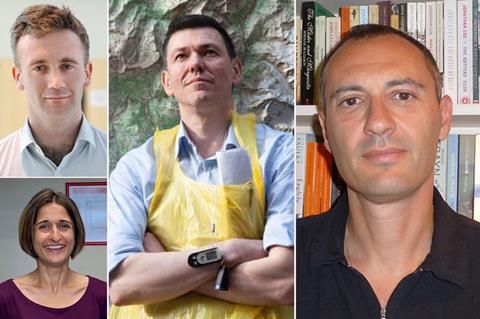
A ‘dream team’ of medical experts working at the forefront of Covid-19 treatment is supporting The Production Guild of Great Britain’s (PGGB) drive to equip UK Covid Supervisors with the best safety information in the world.
Delivered by the PGGB and fuelled by £100k British Film Commission (BFC) investment, the High Level Covid Supervisor Training programme walks production professionals through two full days of advanced education on COVID-19 disease mitigation and infection prevention control, covering screening, testing, behaviour change, medical pathways and scene-by-scene risk assessments. A key section of this training is delivered by a team of world class medical specialists.
“What we’re building is essentially a specialist group of UK Covid Supervisors with comprehensive insight into complexities of Covid-19 safety in practise, relating to different types of shoots, supported through our Virtual Learning Environment to keep pace with the situation and share best practice as we move through and beyond the pandemic,” says PGGB CEO, Professor Lyndsay Duthie.
Experts for the course’s medical module were handpicked by Dr Akbar de’ Medici, medical director of Cavendish Health, a specialist consultancy managing the safe return to filming for high-profile productions from the UK’s major studios. The team assembled are impressive and well qualified.
Professor of Intensive Care Medicine Hugh Montgomery leads a world-class research group at University College London and chairs the National Emergency Coronavirus Critical Care Committee. You may recognise him from many television news interviews where he has described pressures facing NHS staff in his intensive care unit at a major London NHS trust.
“The arts are so important for the mental health of individuals, they‘re a touchpoint for society,” he says. “Our job has been to work with the PGGB and BFC to figure out how to get the film industry working at full tilt again, we want everyone to be safe and we want you to be able to get your productions insured.”
After introducing the origins and presentation of Covid-19, the training delves deep into transmission trends, the importance of ventilation and the risk of asymptomatic carriers. Scenarios of how fast and far the virus can spread with just one infected crew member in unventilated space, are sobering. “Behaviour is key,” says Hugh. “You can’t change the virus on your film set, but you can change the environment. And if tests aren’t deployed in the right way, they won’t be able to protect your teams.”
Dr Trupti Patel, Consultant in Infectious Diseases, Microbiology and Virology discusses the methods of embedding effective screening regimens on sets, sharing insight into recommendations on repeat testing, PCR versus rapid antigen testing and the problem of false negatives. She also weighs the pros and cons of the array of mask, respirators and other PPE options available. “Using infection control nurses is the best way to mitigate against risks, to prevent outbreaks and manage them as they happen, where rapid quarantine is key”, she says.
Currently Clinical Director at NHS England & Improvement, Professor Anthony Kessel spent the previous decade as Director of Public Health at Public Health England and National Director of Public Health Strategy at the Health Protection Agency – where he worked at the centre of responses to Ebola and Swine Flu outbreaks. Referencing BFC’s Working Safely Guidelines he stresses the need to safeguard against wider-reaching impacts of COVID-19 on crew mental health and wellbeing.
Dr Michael Patterson, Consultant in Critical and Acute Care at UCL Hospitals, and Chief Medical officer of the FA, joins the session between shifts. Zooming in from a hospital room, he explores the importance of buy-in and autonomy. “Covid measures are a new skill for everyone,” he says. “Information and training are crucial foundations upon which to build understanding. That means working with AD’s, HoD’s, all the way up to the people driving strategy for the production.
“We can’t just say, ‘here’s a standardised way of delivering infection control’, we must look at how people are working, then figure out how to make processes more infection controlled. Ease equals safety; everything you do should make it easier for people to work safely. An agile advisory structure is also essential, it helps you see where things are going, budget for it and make an A-Z plan.”
Once eight modules and a reflective assignment are successfully completed, participants become ‘High Level Accredited Covid Supervisors’, a status certified by the PGGB and BFC, which will be accredited by The CPD Standards Office.
They gain exclusive access to the PGGB’s Virtual Learning Environment, an online learning platform that is regularly updated with CPD materials, additional recordings, updates and resources as guidance adapts.
Samantha Perahia MBE, head of production UK, British Film Commission, said: “The UK is one of the safest places in the world in which to film right now, with productions following the British Film Commission’s incredibly rigorous Working Safely During COVID-19 in Film and High-end TV Drama Production guidance. This significant investment in training shows our commitment to supporting the ongoing excellence of our professional crew.”
The next round of PGGB/BFC High Level Covid Supervisor Training will run online on 6th & 13th March 2021. Apply now via the PGGB website. £400 + booking fee + VAT (bursaries available)
















![[L-R]: Amanda Villavieja, Laia Casanovas, Yasmina Praderas](https://d1nslcd7m2225b.cloudfront.net/Pictures/274x183/6/4/1/1471641_pxl_20251224_103354743_618426_crop.jpg)











No comments yet